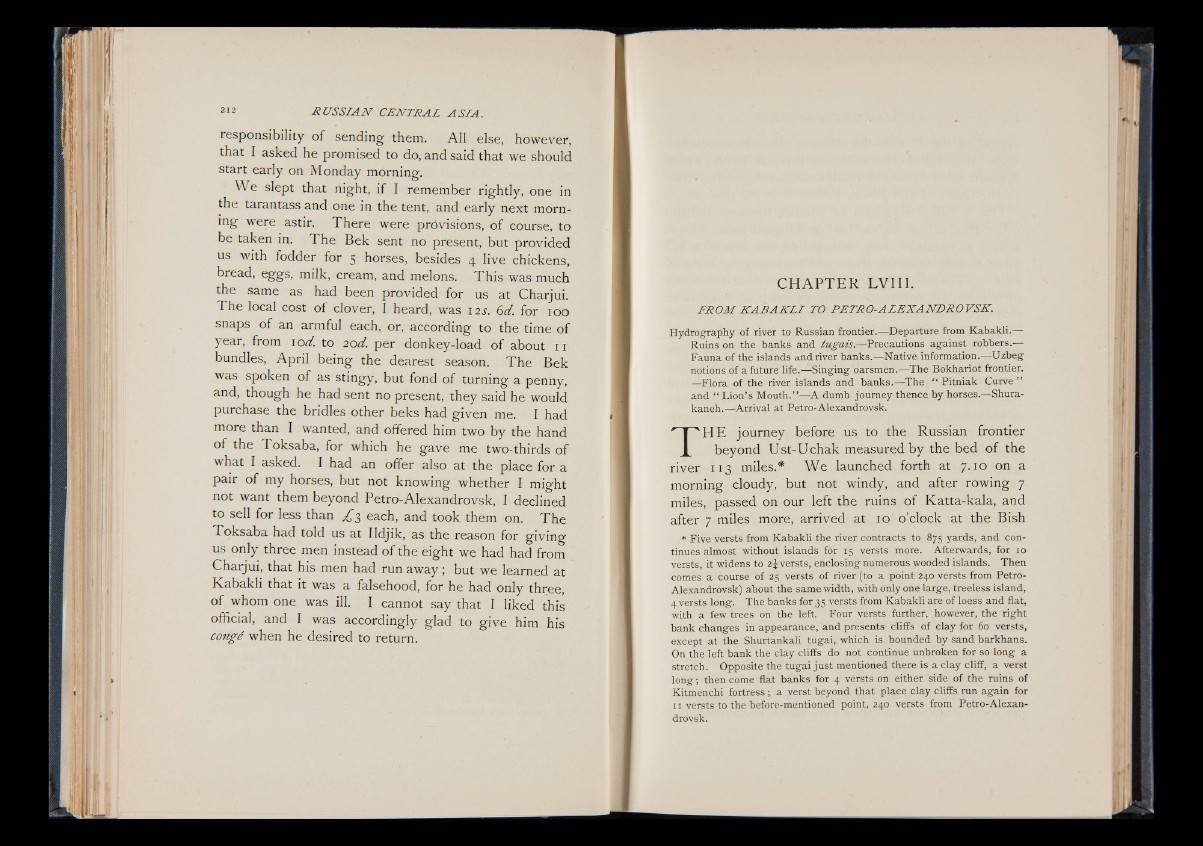
responsibility o f sending them. All else, however,
that I asked he promised to do, and said that we should
start early on Monday morning.
We slept that night, if I remember rightly, one in
the tarantass and one in the tent, and early next morning
were astir. There were prévisions, of course, to
be taken in. The Bek sent no present, but provided
us with fodder for 5 horses, besides 4 live chickens,
bread, eggs, milk, cream, and melons. This was much
the same as had been provided for us at Charjui.
The local cost of clover, I heard, was 12s. 6d. for 100
snaps of an armful each, or, according to the time of
year, from iod. to 20d. per donkey-load of about 11
bundles, April being the dearest season. The Bek
was spoken o f as stingy, but fond of turning a penny,
and, though he had sent no present, they said he would
purchase the bridles other beks had given me. I had
more than I wanted, and offered him two by the hand
of the Toksaba, for which he gave me two-thirds of
what I asked. I had an offer also at the place for a
pair of my horses, but not knowing whether I might
not want them beyond Petro-Alexandrovsk, I declined
to sell for less than £ 3 each, and took them on. The
Toksaba had told us at Ildjik, as the reason for giving
us only three men instead of the eight we had had from
Charjui, that his men had run away ; but we learned at
Kabakli that it was a falsehood, for he had only three,
o f whom one was ill. I cannot say that I liked this
official, and I was accordingly glad to give him his
congé when he desired to return.
C H A P T E R L V I I I .
FROM K A B A K L I TO P E TRO -A LEX AN D R O V SK .
Hydrography of river to Russian frontier.— Departure from Kabakli.—
Ruins on the banks and tugais.—Precautions against robbers.—
Fauna of the islands and river banks.—Native information.—Uzbeg
notions of a future life.—Singing oarsmen.The Bokhariot frontier.
‘—Flora of the river islands and banks.—The “ Pitniak Curve”
and “ Lion’s Mouth.”—A dumb journey thence by horses.—Shura-
kaneh.—Arrival at Petro-Alexandrovsk.
TH E journey before us to the Russian frontier
beyond Ust-Uchak measured by the bed of the
river 113 miles.* W e launched forth at 7.10 on a
morning cloudy, but not windy, and after rowing 7
miles, passed on our left the ruins of Katta-kala, and
after 7 miles more, arrived at 10 o’clock at the Bish
* Five versts from Kabakli the river contracts to 875 yards, and continues
almost without islands for 15 versts more. Afterwards, for 10
versts, it widens to 2$ versts, enclosing numerous wooded islands. Then
comes a course of 25 versts of river (to a point 240 versts from Petro-
Alexandrovsk) about the same width, with only one large, treeless island,
4 versts long. The banks for 35 versts from Kabakli are of loess and flat,
with a few trees on the left. Four versts further, however, the right
bank changes in appearance, and presents cliffs of clay for 60 versts,
except at the Shurtankali tugai, which is bounded by sand barkhans.
On the left bank the clay cliffs do not continue unbroken for so long a
stretch. Opposite the tugai just mentioned there is a clay cliff, a verst
long; then come flat banks for 4 versts on either side of the ruins of
Kitmenchi fortress ; a verst beyond that place clay cliffs run again for
11 versts to the before-mentioned point, 240 versts from Petro-Alexandrovsk.